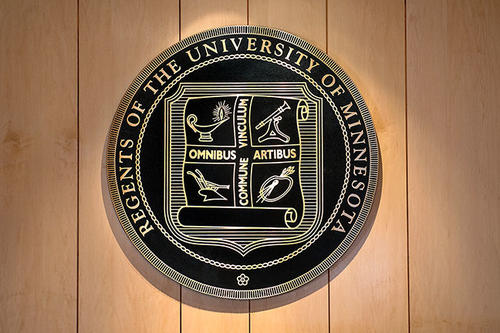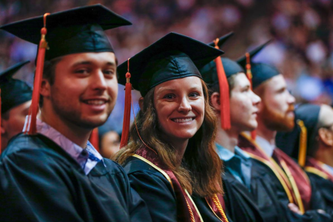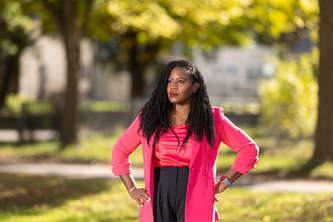
What: University of Minnesota Board of Regents meeting
When: Thursday, June 8 and Friday, June 9, 2017
Where: Sixth floor, McNamara Alumni Center, 200 Oak St. S.E., Minneapolis
Through continued reprioritization and reallocation, combined with other factors, University of Minnesota President Eric Kaler’s proposed FY 18 operating budget maintains a commitment to access and affordability for all U of M students.
The University’s Board of Regents will review Kaler’s recommended $3.9 billon operating budget on Thursday, June 8, and is expected to take action during a special meeting on June 20.
“While it is challenging to build a budget that achieves strategic goals and advances the University’s excellence in the face of rising costs and limited revenue growth, this budget successfully addresses key priorities I share with the Board,” said Kaler. “It does so by investing to build and maintain excellence, by incorporating a tuition and fee plan that is responsive to the needs of students and sensitive to market conditions, and by challenging all units within the University to prioritize and improve efficiency in strategic ways.”
Kaler’s proposal, reflective of decisions made by state lawmakers who only partially funded the University’s request this year, includes tuition increases for Twin Cities campus resident undergraduates of $376 per year (3 percent) and $102-$120 per year (1 percent) for resident undergraduates on the Crookston, Duluth, Morris and Rochester campuses. However, the increase would be almost completely offset for many students eligible for federal Pell awards and Minnesota state grants. Additionally, the U of M Promise program will continue to provide more than $30 million in aid for nearly 15,000 Minnesota families with incomes up to $120,000.
Tuition increases for non-resident, non-reciprocity undergraduate students on the Twin Cities (10 percent, or $2,222 per year) and Duluth (5.5 percent, or $892 per year) campuses are proposed, with the increase for continuing students capped at 5.5 percent. At the Morris campus, the recommended non-resident, non-reciprocity rate is proposed to increase by $140 per year (1 percent). Graduate and professional rates remain competitive with the market, generally increasing 0 – 5 percent. Minnesota resident students at the Medical School will see no tuition increase.
Student fees and room and board rates are proposed to rise on all campuses. Estimated increases in the total cost of tuition, fees and room and board for resident undergraduates will range from 0.4 to 3.5 percent, or $20,375 to $24,003 in total costs, depending on which campus a student attends.
Making strategic investments
Given state funding levels, changes in tuition and fees, and continued internal reallocation, this budget strategically supports core operational activities. Specifically, it recommends investments in:
- infrastructure (technology/facilities);
- student services and support (including mental health service enhancements proposed by each campus and funds to address sexual assault and Title IX needs on each campus);
- targeted operating budgets of colleges and campuses; and
- a competitive compensation plan to retain and recruit top faculty and staff.
Administrative reallocations of nearly $11 million are proposed for FY 18 as well, part of Kaler’s goal to reallocate $90 million by FY 19. Implementation of this proposal means the University will be approximately $79 million, or 88 percent, toward the goal with one year remaining.
Regents are seeking feedback from the University community on the proposed operating budget. The Board has launched a new online feedback form to gather input. The period for public comment is from noon, June 2, until noon, June 13. More details are available on the Regents website.
Proposed FY 18 annual capital improvement budget
To ensure the University is equipped to deliver on its mission and Kaler’s vision, Regents are expected to take action on a proposal recommending $275.5 million in capital projects to begin design or construction. Many of the proposed capital budget projects were previously included in the institution’s 2017 capital request to the state. Governor Dayton and the Legislature supported the University’s work in advancing healthcare for Minnesotans, including funding a new Health Sciences Education Facility that will keep health sciences graduates at the forefront of their practice. The State also invested in facilities that advance STEM research and teaching—through the Chemistry and Advanced Materials Science Building on the Duluth campus and the Plant Growth Research Facility on the St. Paul campus. The balance of the capital budget is comprised of internally funded projects, such as general renovations and routine repair and replacement intended to preserve the University’s capital assets.
Regents are also expected to:
Act on the System-Wide Strategic Plan, which includes feedback received since their review at the May meeting. If approved, the plan will move into an implementation phase.
Review new sexual misconduct policies intended to advance the University’s sexual misconduct prevention and response efforts by providing comprehensive information about prohibited conduct, adjudicative procedures and resources in system-wide policies that apply to the entire University community.
Discuss the important role of diversity through a conversation about unconscious bias in hiring and promotion and a work session on diversity in undergraduate enrollment on the Twin Cities campus. In the work session, rescheduled from the May meeting, Board members are expected to discuss how the University can better channel its resources to address the growing needs of minority communities in Minnesota.
Elect new leadership. The Nominating Committee’s recommendation for Board Chair and Vice Chair as well as Secretary and Treasurer will be considered for Board approval. Newly elected Board leadership will assume their roles July 1, for a two-year term.
Receive a report from the Faculty Consultative Committee (FCC). In this annual update, FCC Chair and Associate Professor of Pharmacology Colin Campbell will provide the committee’s spring semester report, recapping work in student mental health, equity and diversity, the system-wide Strategic Plan and more, and discuss future leadership of the FCC. Following his report, Campbell will be recognized for his service as chair the past two years.
Following a non-public meeting of the Litigation Review Committee, the full Board will meet at 8:45 a.m. on Thursday, June 8 to review and discuss the President’s recommended operating budget. On Friday, June 9, a work session on diversity in undergraduate enrollment on the Twin Cities campus will begin at 7:30 a.m., followed by the full Board meeting at 9 a.m. For more information, including meeting times and locations, go to the Regents website.
- Categories:
- Campus Affairs





